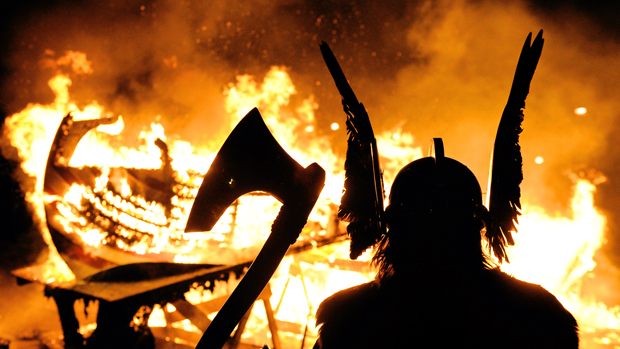Ragnarok: will the world end in Viking apocalypse tomorrow?
Earth predicted to split open and release the inhabitants of the underworld before epic battle

A free daily email with the biggest news stories of the day – and the best features from TheWeek.com
You are now subscribed
Your newsletter sign-up was successful
THE end of the world is nigh, according to Viking experts, who believe the final mystical battle on Earth might begin on 22 February 2014. It follows a string of similar disaster predictions, including the Mayan Apocalypse, in which the dark planet Nibiru failed to knock Earth out of the sky on 21 December 2012. So what is Ragnarok and should we be concerned?
What does Ragnarok mean?
It is an Old Norse word made up of "ragna", which means conjure, and "rok", which can mean origin, cause or fate. As a whole, it is usually interpreted as the "final destiny of the gods".
The Week
Escape your echo chamber. Get the facts behind the news, plus analysis from multiple perspectives.

Sign up for The Week's Free Newsletters
From our morning news briefing to a weekly Good News Newsletter, get the best of The Week delivered directly to your inbox.
From our morning news briefing to a weekly Good News Newsletter, get the best of The Week delivered directly to your inbox.
What happens in Ragnarok?
Norse mythology predicts the Earth will split open and release the inhabitants of the underworld, culminating in an epic battle. First comes three consecutive winters, with no summers inbetween, followed by a general decline in morality. Wolves will devour the sun and moon, plunging the earth into darkness, stars will vanish from the sky and a cockerel will "raise the dead". Earthquakes will release the terrible wolf Fenrir, snakes will rise from the sea and the inhabitants of hell will ride in on a ship for a titanic battle among the gods, men and other creatures. Odin, the father of the gods, will be killed by Fenrir, Earth will fall into the sea, and life as we know it will cease to exist.
On the plus side, a new and idyllic world will then arise, where wickedness and misery no longer exist.
Who predicted Ragnarok?
A free daily email with the biggest news stories of the day – and the best features from TheWeek.com
The apocalypse was described in the 13th century book Prose Edda, believed to have been written by Snorri Sturluson in Iceland. Together with the Poetic Edda, it comprises the major store of pagan Scandinavian mythology. However, the origin of the apocalypse date is dubious. It has been predicted by experts in Norse mythology from the Jorvik Viking Centre in York, who admit their calculations are not "scientific". The 22 February is the end of the Nordic feast of Jolablot, marking the end of winter, they say.
Sceptics have noted that this does not explain why 2014 would be Earth's final year and note that 22 February curiously coincides with the centre's annual Viking Festival.
So, will the earth end tomorrow?
As The Independent says, don't cancel your weekend plans just yet.
-
 The environmental cost of GLP-1s
The environmental cost of GLP-1sThe explainer Producing the drugs is a dirty process
-
 Nuuk becomes ground zero for Greenland’s diplomatic straits
Nuuk becomes ground zero for Greenland’s diplomatic straitsIN THE SPOTLIGHT A flurry of new consular activity in the remote Danish protectorate shows how important Greenland has become to Europeans’ anxiety about American imperialism
-
 ‘This is something that happens all too often’
‘This is something that happens all too often’Instant Opinion Opinion, comment and editorials of the day
-
 Epstein files topple law CEO, roil UK government
Epstein files topple law CEO, roil UK governmentSpeed Read Peter Mandelson, Britain’s former ambassador to the US, is caught up in the scandal
-
 Iran and US prepare to meet after skirmishes
Iran and US prepare to meet after skirmishesSpeed Read The incident comes amid heightened tensions in the Middle East
-
 Israel retrieves final hostage’s body from Gaza
Israel retrieves final hostage’s body from GazaSpeed Read The 24-year-old police officer was killed during the initial Hamas attack
-
 China’s Xi targets top general in growing purge
China’s Xi targets top general in growing purgeSpeed Read Zhang Youxia is being investigated over ‘grave violations’ of the law
-
 Panama and Canada are negotiating over a crucial copper mine
Panama and Canada are negotiating over a crucial copper mineIn the Spotlight Panama is set to make a final decision on the mine this summer
-
 Why Greenland’s natural resources are nearly impossible to mine
Why Greenland’s natural resources are nearly impossible to mineThe Explainer The country’s natural landscape makes the task extremely difficult
-
 Iran cuts internet as protests escalate
Iran cuts internet as protests escalateSpeed Reada Government buildings across the country have been set on fire
-
 US nabs ‘shadow’ tanker claimed by Russia
US nabs ‘shadow’ tanker claimed by RussiaSpeed Read The ship was one of two vessels seized by the US military